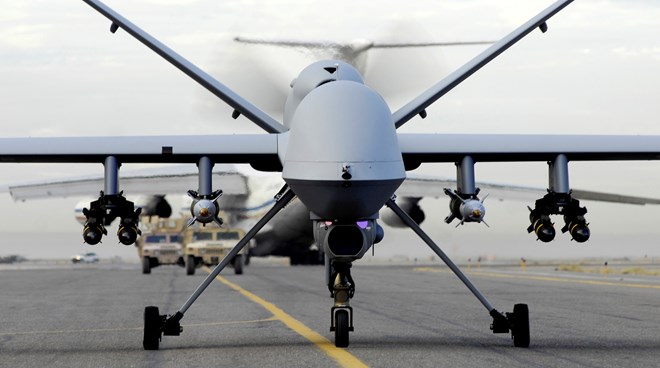
Sunday June 11, 2017
By CHARLIE SAVAGE, HELENE COOPER and ERIC SCHMITT

A fully armed MQ-9 Reaper taxis down an Afghanistan runway (U.S. Air Force photo/Staff Sgt. Brian Ferguson)
WASHINGTON — The United States military said on Sunday that it had carried out a drone strike in southern Somalia against the Shabab, the Qaeda-linked insurgent group — apparently the first such strike since President Trump relaxed targeting rules for counterterrorism operations in that country in March.
The strike, which the military said targeted a command and logistics portion of a Shabab camp, came two and a half months after Mr. Trump cleared the way for offensive strikes in Somalia, a chaotic nation in the Horn of Africa, without a specific self-defense rationale.
The military said that it believed that the strike, which took place around 2:20 a.m. Eastern time about 185 miles southwest of Mogadishu, the capital, had killed eight militants. Military officials said the United States had so far seen no reports that any civilians were killed.
“The U.S. conducted this operation in coordination with its regional partners as a direct response to al-Shabab actions, including recent attacks on Somali forces,” Dana W. White, the Pentagon’s chief spokeswoman, said in a statement.
The attack was carried out by at least one armed Reaper drone flying from a secretive air base in Djibouti, an American official said. The Reaper dropped multiple Hellfire missiles on the Shabab camp, which American military surveillance aircraft had been monitoring for months.
The official said that more such strikes should be expected now that American and Somali officials have closely analyzed potential targets that could be attacked using the new authorities that Mr. Trump approved.
In a statement, the United States Africa Command portrayed the camp as part of a broader Shabab stronghold, from which the Islamist group has launched attacks over the last eight months in which it overran three African Union bases for peacekeeping soldiers from Burundi, Kenya and Uganda. The group seized military weapons in those assaults.
“The terror organization has taken advantage of safe haven,” the Africa Command statement said. The group, it added, has cemented its control over southern and central Somalia, used the area to plot and direct terrorist attacks, stolen humanitarian aid and sheltered other terrorists.
The Somali government said in a statement that the Shabab command and supply hub had been destroyed, a loss that will “ultimately disrupt the enemy’s ability to conduct new attacks within Somalia.” A government official said that eight militants had been killed.
The United States military has been training and advising African Union and Somali government forces in the country, while becoming more directly involved in its civil war for the past several years. Last month, two American Marines were wounded and one was killed while accompanying Somali forces on a raid against Shabab militants, the first American combat death in Somalia since the 1993 “Black Hawk Down” battle in Mogadishu.
Toward the end of the Obama administration, the White House signed off on a proposal to deem the Shabab an affiliate of Al Qaeda. That brought the insurgent group — which sprouted up in 2007 after Ethiopia, with American backing, invaded Somalia and overthrew an Islamist council that had briefly taken control of the country — under the congressional authorization to use military force against the perpetrators of the Sept. 11, 2001, terrorist attacks.
Soon after Mr. Trump took office, the Defense Department proposed a further escalation. It wanted Mr. Trump to declare parts of Somalia to be an area of active hostilities, exempting it from the need to obey special targeting limits, known as the Presidential Policy Guidance, that Mr. Obama imposed in 2013 for counterterrorism strikes outside conventional war zones.
Those limits included an obligation to receive high-level interagency approval before carrying out such a strike; a need for the target, and an individual, to pose a threat to Americans, not just to be part of the enemy force; and a requirement of near certainty that no civilians would be killed.
Aspects of those limits had been eroding in Somalia, because in 2016, the United States military increasingly invoked an exception for airstrikes carried out under the rubric of self-defense — including, sometimes, the defense of Somali government forces even when no American advisers were under threat.
For instance, in March 2016, American aircraft struck a Shabab training camp, killing around 150 people who American officials said were newly minted fighters assembled for a graduation ceremony. Africa Command officials justified the strike, which they undertook without going through the 2013 process, as a matter of self-defense, saying they believed the militants intended to attack a peacekeeping base.
Late this March, Mr. Trump signed off on the Pentagon’s proposal to exempt much of Somalia from the 2013 limits, clearing the way for the Pentagon to carry out purely offensive strikes, and without going through interagency vetting.
Still, the head of Africa Command, Gen. Thomas D. Waldhauser, has said that he is exercising caution in using his new authorities, and that he had decided to keep the standard of near certainty that there would be no civilian deaths. A famine in Somalia has prompted many civilians, often armed, to move around in search of food and water, which has made it harder to identify militants.
Against that backdrop, months passed without Africa Command carrying out strikes under the new authorities — a surprising forbearance that seemingly came to an end on Sunday.
The military’s statements about the strike did not invoke a specific self-defense rationale, instead portraying the operation as part of a broad strategy to degrade the Shabab’s ability to recruit, train and plot terrorist attacks.
Charlie Savage and Helene Cooper reported from Washington, and Eric Schmitt from Antigua, Guatemala.